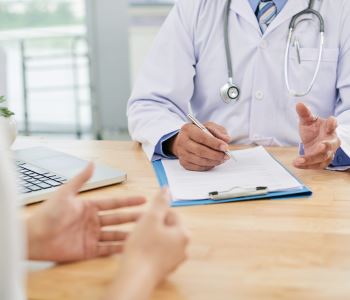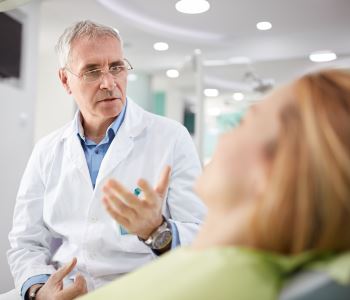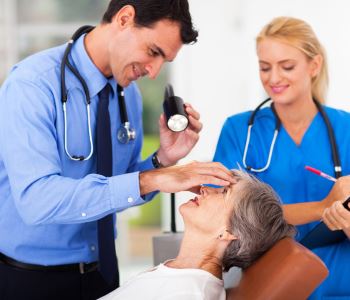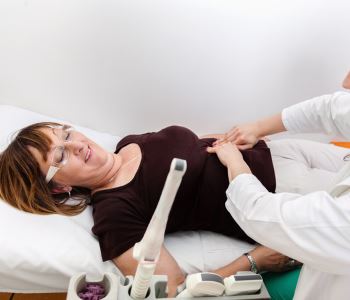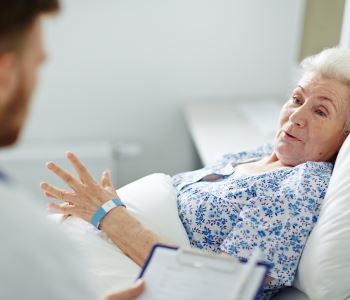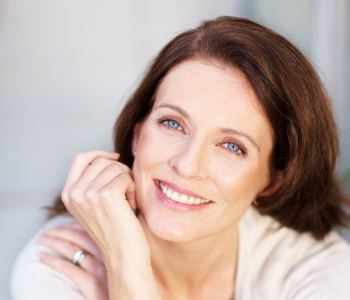Many women experience issues such as depression, low sex drive, or hot flashes as they age and feel they “just need to deal with it.” The symptoms of hormonal changes may be a natural part of the aging process, but women certainly have the power to age beautifully! The reality is that many of these issues – such as hot flashes, night sweats, mood swings, poor sleep, loss of sex drive, weight gain, and depression – are associated with hormonal changes that can be treated effectively using natural methods.
Our physicians use bio-identical hormone replacement therapy (BHRT), focusing on providing hormones that are identical to those made naturally by the human body. Unlike standard hormone therapy, which is synthetic and can cause an imbalance, this treatment is formulated with natural ingredients such as wild yams. Restoring optimal hormone levels, which naturally decrease with age, can protect you from osteoporosis, as well as certain cancers that are more prevalent during and after menopause. Undergoing hormone replacement therapy with bio-identical hormones from our Portland anti-aging center not only gives you the ability to extend your life, but also improves the quality of your life.
What to Expect
At Thrive, we understand that every woman is different, and everybody has unique needs. After reviewing your health history and analyzing lab tests, we create an individualized treatment plan for your specific needs. The goal of bio-identical hormone therapy is to replace what your body is missing, thus restoring your youthful energy and health. The program is tailored to your individual needs, to help your body achieve its own unique perfect balance. We may also provide nutritional advice or recommend additional supplements to help you achieve overall wellness.
By following our comprehensive program, many women find that they feel more energetic, happier, and more balanced both physically and emotionally within six weeks, and continue to report positive results for years after beginning their bio-identical treatment.
If you are suffering the effects of untreated menopause, or you are looking for a natural alternative to synthetic hormone replacement, contact us so you can thrive!
Transform your life and bring the much-needed edge and vitality with bioidentical hormone replacement therapy.

The wellness hour. An in-depth discussion with today’s top physicians and medical leaders.
And now your host, Randy Alvarez. You’re watching all this out. A leader in medical news and information. I’m Randy Alvarez, today’s topic, what you need to know if you’re considering bioidentical hormone replacement therapy. With us, we have an expert on the topic, doctor Maddox. Doctor Maddox, welcome to the programme.
Randy, thank you for having me.
Now you know, before we get into today’s topic, I have a lot of questions about bioidentical hormones, some of the protocols you’re using, you know we should mention because I know your age. You look at least ten years or more younger than your age. So, and, and, you told me we were walking outside, you say that you walk your talk but yeah, you’ve been in around biomedical hormones for how long studying it?
Almost 10 years now. The first two years I spent working with their doctor’s bioidentical hormone experts and just mastering it, learning their protocols, truly understanding how it works. Working with their patients directly and indirectly and for the past eight years I’ve been doing it on my own, working with my own patients.
The results, big results, big life changes?
Life changing results, absolutely phenomenal, and that’s why I first got into it. It just because I was So, interested in seeing the life transforming.
Really, yeah, interesting. Now it’s become a a bit more mainstream, you know, we’ve, we’ve, had the wellness hour show for 10 years now and I remember the early, you know, early times you know there wasn’t a lot of information about it. Has it come a long way in the last 10 years?
It really has. I think it’s starting to be a little bit more accepted by the greater medical community and just by the general population and it’s the, I mean, the results speak for themselves. People are feeling better. They’re talking about it as I mentioned to their friends and family members and everyone wants to feel better So,
In your practise as a more women than men?
I would say that it’s a little bit more women, but men are starting to come around too because men go through a similar process of age-related hormonal decline as women do, and everyone wants to feel better.
So, in a tough economy, you know some of the, you know, cliches there are that you know the safest investment is yourself. What are your thoughts on that?
I would agree with that 100% and actually I was just reading an article in Forbes magazine recently that that they were saying basically exactly that because with a suppressed economy, it’s so, much more competitive out there when it comes to getting a new job, the interviewing process. Older people are being replaced by younger people all the time in the workforce.
Interesting, okay.
So, the older people they want to, they want to feel better. They want to have the energy, the drive, the mental clarity.
So, they come to you, they just want like an edge in business. They want to feel better. Absolutely, so, whether it’s being more effective at their career or in their personal life, or even just at their hobbies, they want to have that extra edge in life and they want to have that libido back that sex drive to be back to where it was So, they can enjoy their relationship with their significant other. They want to have that mental comprehension. They want to have that memory that recall So, They can be again that much more effective at whatever they do, whether it’s in their career or at the personal life, or again, with their hobbies.
So, let’s start that, of course, today’s topic biotechnical hormones. Who is the ideal candidate? At what time do they start coming in?
Well, let me give you an example. 40-year-old female that’s starting to have symptoms of menopause, it’s known as perimenopause and what it is it’s the time in a woman’s life when they’re starting to go through the transitional decline of the hormones. So, they’re losing their sex drive. They’re losing that extra edge that they have. They’re losing a little bit of memory they have brain fog. They may be depressed. They may have migraine headaches; a lot of symptoms are starting to come up. Fatigue is a number one symptom. Why patients come to see me to begin with. So,
What about menstrual cycles? The regular menstrual cycles?
The menstrual cycles are do start to become more irregular. So, with that is when you know that we’re in the hormonal decline. So, the people that come to me, they don’t want to be on the antidepressants. They don’t want to take a laundry list of medications. They want to preventatively feel better. They want to look better. They want to feel better and they want to address the issues at the core.
So, these things like anxiety, exaggerated PMS, things like that, you say it’s what a hormonal imbalance?
It absolutely can be. Now. Some people do need antidepressants. There is a place for those medications, but a lot of times patients don’t need that. It’s due to hormonal decline and by doing bioidentical hormone replacement therapy, they actually start feeling better.
So, if somebody were to ask you your philosophy, when it comes to bioidentical hormones or age management in general, and like you know, what do you doing you know how do you dumb it down? I I should say to help.
We’re trying to essentially restore the hormone levels back to youthful levels because we know through scientific evidence that hormone levels decline with aging. Okay, so, by getting them back to youthful levels is when we start seeing the maximum benefits.
So, somebody in their 40s okay 45, 50. You return their levels back to when they were 25, 18 years old, and what’s the goal there?
Well, it just depends on the individual because everyone is so, unique, their genetic makeup. So, that’s when we have to do the testing the evaluation it depends on what the individual goals are, but ultimately, we’re just trying to replace the part that’s missing, So, they get all the benefit with the least amount of side effects.
Okay, So, with these hormones okay, and by the way, are the injectables or their pills or they cream, what is it?
There’s a variety of ways to deliver the hormones. We do, pellet implants, hormone creams, injectables, some are delivered orally. It just depends on what the hormone is and how what the patient’s preference is and how to take it.
Okay, So, when, when, you give them a replacement and of course I’m sceptical, or you know respectfully. Sure, the they start feeling younger. I mean, what do they tell you?
That they the number one thing is that they just have more energy and my favourite thing is is when the female patients come back and say Doctor Maddox, thank you so, much my libido is up and my husband wants to thank you.
So, what are the commonly replaced hormones? Take me through that process? You know what? What are they?
Well, testosterone is very popular both among men and women. We always think of testosterone as a male hormone, but believe it or not, a lot of women need testosterone replacement. So, women have testosterone levels. Women do have testosterone, yes. And it’s important for their bones and their muscles and their skin and brain function. The list goes on and on. Oestrogen is another one. Obviously known as the female hormone. So, that’s the main hormone that declines in females as they get closer to menopause. Progesterone, another hormone that’s found in both men and women but primarily used in women, especially when women are cycling. So, still having their menstrual cycle and then after menopause, depending on the condition of the individual, they may need a combination of oestrogen and progesterone. What defines menopause by the way?
The medical definition of menopause is being without menstruation for a certain period of time, So, at that point, the woman is no longer in their reproductive years, So, their ovaries are no longer producing the hormones at appropriate levels or eggs to therefore be fertilised for reproduction.
All right now. What are the frequently asked questions? I mean on the console, what does every woman want to know about hormones? I mean, is it safe? I mean, is that one of them?
Yeah, that’s probably the number one question that comes up and there is, there is some controversy that lies around the bioidentical hormone and the synthetic hormones. In my opinion, there is a difference. The bioidentical hormones are biologically identical in their chemical structure to what exists in our bodies, So, it’s kind of like replacing or tricking our bodies into doing what it would it’s no longer doing anymore. So, it’s replacing what it doesn’t know the difference between the bioidenticals and what our body would normally produce because it’s the same. Back to your original question about what is the most common questions with the bioidentical hormones is that is it safe? Of course, I mean it. It can be dangerous in certain levels, but it’s always about balance. So, through the testing that we do, and through my experience we make sure that this treatment is safe for you, because if you give too much hormone, there is a risk for certain types of negative impacts, such as too much testosterone, can cause facial hair growth in women and women don’t want facial hair growth.
Is it permanent?
It’s not permanent, generally speaking, you just back off on the dose of the testosterone and the hair goes away. In men, men can actually lose their hair. They can convert the testosterone to other hormones which can cause them to grow breasts. So, again, we want to make sure that the hormone levels are safe and we do that through continued testing and through my experience.
And where do you get your education? By the way in bioidentical hormones.
So, my training comes from as I was saying earlier from working with other doctors, primarily in the beginning and then through continuing education, I’m constantly going to additional seminars and trainings and continuing education works workshops on an annual basis to make sure that I stay on the most up-to-date information about bioidentical hormones and how to prescribe it. So, basically, it’s a bunch of doctors that are getting together and sharing their experience on bioidentical hormones and the value and benefits that their patients are getting from it.
So, like the anti-ageing society you attend their meeting?
Absolutely. Okay, I’m a member and active in their meetings.
So, what goes on at those meetings? They’re just sharing?
Well, there’s protocols or what. Yeah, I mean they’re sharing new protocols they are bringing new scientific research and evidence to the table to show the benefits of testosterone replacement in women and men for things such as bone density, libido, improving quality of life, depression, migraine headaches, fatigue.
Really! Help me. Understanding the mechanism. Why is it that as you say, people get more energy when you replace their hormones? Well, why is that?
Because hormones simply put are chemical messengers. So, when the messenger. …









